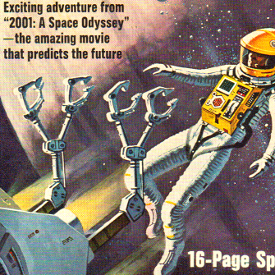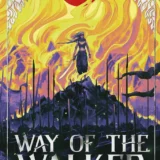One of the most influential elements of genre fiction can come from the allusion to classic works of literature the audience is familiar with. Odds are pretty good that if a villain quotes Poe to infuse fear in a victim or a hero sites Twain to lighten a moment, most of us will recognize the reference source. But since hardcore fandom stems from curiosity of the unknown, an intriguing element can also rise from that which is not.
J.K. Rowling realized the value of such a fictional work in the final installment of Harry Potter and the Deathly Hallows with the reference to a children’s fairy tale collection titled The Tales of Beedle the Bard. The book’s significance to the lore of Deathly Hallows helped establish plot credibility to the Potter saga. It didn’t take long for the book to gain a strong interest by the fan base, influencing the author to publish an actual edition for public consumption with proceeds going to the children’s charity Lumos.
Again, we look at the “what-if” possibility. But this time, we ask what-if that work of literature mentioned within the fold of a story was an actual publication.

First out of the box, we will look at the science fiction novel Farewell Atlantis by the character Jackson Curtis in the 2009 film 2012. The movie was co-written by Roland Emmerich (Independence Day) and Harald Kloser. The role of Curtis was played by John Cusack. As part of a marketing campaign, a faux website was created for author Curtis including a first chapter excerpt from the novel Farewell Atlantis published by Hudson Cameron Press (equally faux). The premise is enhanced with an actual forward written by novelist screenwriter Nick Sagan and gives the audience an opportunity to experience the work in a more personal manner.
We are only provided one chapter of Farewell Atlantis, which comes complete with a dedication “To my family, Kate, Noah and Lilly” and a “Special Thanks to Professor Meyers and Nick Sagan.” There is a dust jacket as well, with reviews from “The Los Angeles Gold Review” and “The Angels Platinum Book Club” along with a brief blurb praising the fictional author Curtis. And of course, there are also the cryptic references to the book in the movie. It is from these few elements (along with conjecture and some editorial privileges) I will review the book that never was.
Review: Farewell Atlantis
Renowned for his short form fiction, Jackson Curtis steps out of his comfort zone with his first full length novel titled Farewell Atlantis. True to form and to the delight of many fans, this near future tale is chock full of vivid imagery and an acute attention to detail. What might come as a surprise to some readers is the insightful character development and compelling examination of the human condition in the face of adversity.
This first person account of a disastrous flight aboard the Space Shuttle Atlantis is nonstop suspense from the start. Opening lines are crucial in setting the tone of a story, and Curtis hits his mark running with, “I am watching Martin die in the pitiless vacuum of space.” This poignant blast from Captain and Chief Systems Engineer Troy Scottsman screams emotion and vulnerability in the harsh environment as his Flight Commander drifts slowly away.
On the outside, Farewell Atlantis is a hard core science-fiction-mystery-adventure novel with larger than life characters. The premise of a Galactic Alignment has played havoc with gravitational forces as the planets cue up. The proton bombardment on planet Earth’s thinning magnetic field in the wake of excessive solar storms brings uncertainty to the future of mankind. As the space shuttle orbits the doomed planet Earth, a saboteur prevents the crew from helping those on the ground.
The author’s attention to detail can in part be attributed to his long association with NASA scientist Professor Douglas Meyers. As head of the Atlantis Space Program, Meyers’ accessibility to shuttle operations and designs made for a perfect collaboration. Not one to ever shirk on research, Curtis undoubtedly consulted with other prominent authorities in astronomy and physics for authentication. If anything can be said about the science behind Curtis’ fiction, it is that he gets it right.
On a closer look of Farewell Atlantis, the hard science gives way to a more emotional and spiritual voyage. The selflessness of presumably doomed characters is endearing for readers looking for a feel good story entwined with such suspense and chaos. It is a rollercoaster ride of tension and optimism. Some critics have accused Curtis of being “naïve and an unabashed optimist,” but in the shadow of today’s current political climate, a ray of hope can go a long way for an emotional fan.
Farewell Atlantis might be the first novel by Jackson Curtis, but in many ways it is a tribute to his many years of penning memorable works of short fiction. Breaking away from the usual hard science fiction audience, this book introduces the author to other genres interested in exploring the human condition. Reported sales of the book may not be impressive at the moment, but publisher Hudson Cameron Press will do well to keep Curtis under their banner as word gets out.

This is what my review might have looked like if the book Farewell Atlantis had actually been written…and if the work was any good. Then again, the character Jackson Curtis had an astute opinion of critics in the film with, “what do they know, right?” It was also pointed out in the film that the book only sold 422 copies. I have to wonder who was right, Curtis or the critics.
The character of Jackson Curtis was not vital to the plot. He did not cause the problem. He did not save mankind. The character was merely a vehicle to show the civilian perspective of the apocalypse and could have been anybody else. But on the other hand, Farewell Atlantis was pivotal to story as its fictional plot represented the selflessness mankind “should” exude when facing adversity.
Light on credibility, the movie 2012 is pure brazen entertainment and guiltily fun to watch. But the occasional mention of a fictional book is what gives the film substance. For a book that never was, it sure would be on my “to read” list if it was. Can you think of any other books that never were?








